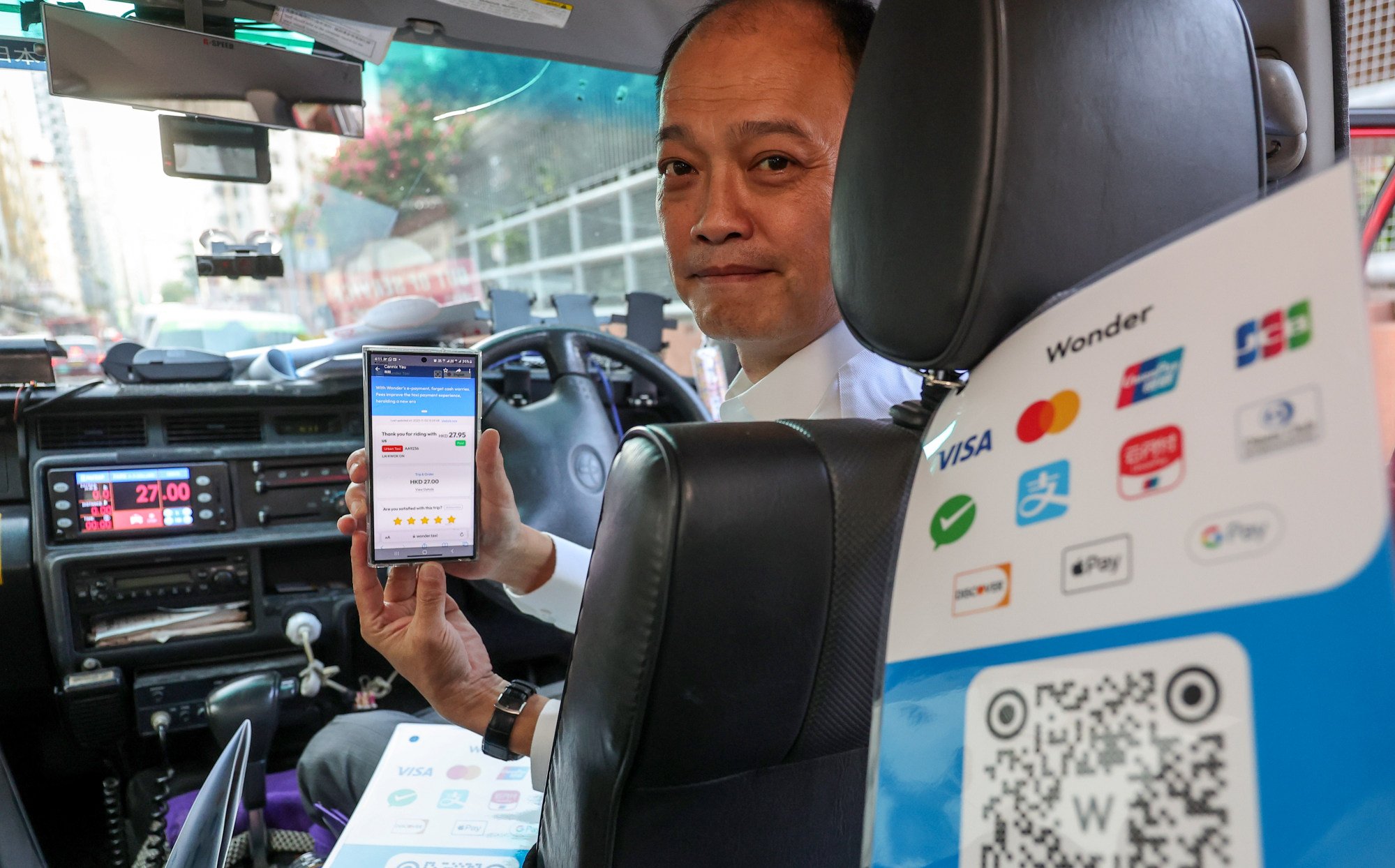
‘Old-fashioned’: Hong Kong taxi industry leader pushes for cabs to install e-payment system amid calls for digital shake-up, but faces roadblocks
- Chau Kwok-keung, chairman of Hong Kong Taxi and Public Light Bus Association, says he will spend HK$1 million to offer free installation of e-payment system
- But some operators resist, calling for payment charges to be passed on to passengers and saying elderly drivers prefer convenience of cash
Chau Kwok-keung, chairman of the Hong Kong Taxi and Public Light Bus Association, on Friday said he would spend more than HK$1 million (US$127,805) to offer free installation of the smart payment Taxi Pay system on a first come, first served basis.
“The cash-reliant taxi trade is very old-fashioned with everything lagging far behind the others,” he said.

“It is inevitable for Hong Kong, as an international city, to adopt e-payments. By introducing an all-in-one digital payment system in taxis, I hope to create a new chapter in the taxi industry for the use of e-payments.”
Chau, founder of Jumbo Taxi which manages a fleet of more than 600 cabs, is also lobbying the Hong Kong Airport Authority to designate a special lane for taxis with smart payment services.
“We plan to install the Taxi Pay system in at least 1,000 taxis by the end of this year to cater to the flood of visitors during the Christmas festive season. We hope to showcase to them that the city’s taxis do have an e-payment option,” he said.
Hong Kong’s taxi drivers are often accused of refusing to move with the times and embrace e-payments as an alternative to cash. Critics noted that the progress of installing the systems in the city’s 18,163 taxis had been slow over the years with cash still dominating.
Hong Kong cabbies dismiss official plan for luxury fleet as unfair, unworkable
The Taxi Pay system, developed by digital firm Wonder, an all-in-one gateway platform for e-payments offering instant settlement, covers QR code-based payments such as WeChat Pay and Alipay, as well as credit card payments such as Visa, MasterCard and UnionPay. Alipay is associated with Alibaba, which owns the Post.
Each system costs about HK$2,700 and is embedded into the taxi’s meter. Passengers can scan its QR code and fill in the required information such as mobile number, verification code and payment method. Drivers only need to install its app on their mobile phone and log in when they begin their shift.
Chau said he was in talks with the city’s leading e-payment platform Octopus for incorporating its reader into the system. At present there are 27,000 taxi drivers offering Octopus payment.
“The Taxi Pay system is easy to use for both passengers and cabbies. Apart from serving visitors, we hope to appeal to young people as nowadays they simply don’t carry cash,” he said.
Hong Kong’s taxi sector to government: work out insurance for extreme weather
Facing lawmakers’ calls to legislate requirements that all taxis provide digital payment services, transport minister Lam Sai-hung said he preferred to explore other options to incentivise cabbies to adopt the digital solutions. He pointed out that some drivers, particularly elderly ones, opted for cash as it was more convenient for them to pay taxi rental and fuel charges.
“Taking this into account, we consider it more appropriate to continue to actively encourage the taxi trade to introduce e-payment methods through different ways at this stage,” he told the Legislative Council on Wednesday.
Driver Lai Kwok-on, who has installed the Taxi Pay system, praised it as convenient to use as he could receive payments on the same day. “I believe this system will be very popular among tourists,” he said.
But many elderly drivers were still reluctant to adopt digital payments for reasons such as tax avoidance and fees, according to Chan Man-keung, an operator who manages more than 100 cabs and heads the Association of Taxi Industry Development.
Hong Kong taxi driver dies after vehicle bursts into flames in high-speed crash
He said most of the more than 200 drivers in his group were elderly and reluctant to accept e-payments.
“I believe digital payments are the trend which is necessary for the industry’s advancement,” Chan said. “But many elderly cabbies in my group are unwilling to use smart payments as they don’t want to report their income for taxation purposes, while others don’t want to pay the handling fees.
“If the airport or other places can designate a special lane for taxis with smart payments, it can serve as an incentive for a wider adoption of e-payments among taxis.”
Wong Po-keung, chairman of the Hong Kong Taxi Owners’ Association comprising about 2,000 taxis, said his group had not prepared to adopt any digital solution as it wanted the authorities to ensure handling fees charged by platforms were passed on to passengers.

“Taxi drivers don’t like to dig into their pockets for the handling fees,” Wong said. “We plan to urge the authorities to liaise with e-payment operators to pass on the fees to passengers instead of charging cabbies.
“It’s not fair to charge taxi drivers as their income is already meagre. Those passengers who want to use the e-payment methods should bear the handling fees themselves, or there should be a free of charge e-payment platform such as PayMe.”
Octopus Group said it had been supporting all cabs in Hong Kong to accept digital payments, adding the company had waived the bank transfer fee until the end of 2025 for drivers using its dedicated app for businesses to make “accepting digital payments more viable”.

